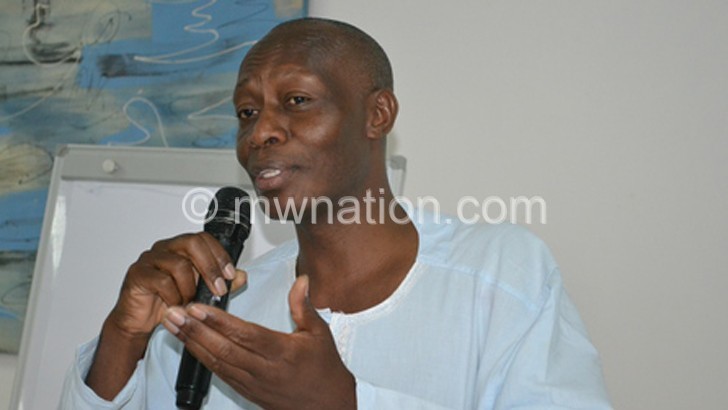‘MEC must rescind decision on CSOs role’
The Malawi Electoral Commission (MEC) has removed the election monitoring role of the civil society organisations (CSOs) accredited to take part in the May 21 Tripartite Elections, instead they will just be observers. The CSOs have cried foul over the new arrangement arguing it will have a negative impact as they will now have no mandate to intervene whenever anomalies arise. Our News Analyst LUCKY MKANDAWIRE talked to Ollen Mwalubunju, executive director of National Initiative for Civic Education (Nice-Trust) a key electoral stakeholder in elections to seek a reaction to MECs decision.

Q
: After being part of the monitoring team in previous elections, MEC has now reduced CSOs mandate to observer status, what is your reaction?
A
: The 2019 Tripartite Elections will be the most highly contested as such as there is need to accredit more organisations as monitors rather than observers given the added advantage that they can contribute towards the integrity and credibility of the elections. We would advise MEC to re-consider its decision because leaving it unattended has the likelihood of worsening the situation. We urge MEC to view the election service providers as partners and not adversaries.
There have been times in history of elections in Malawi where CSOs and Nice Trust reports rescued MEC from undue accusations from political parties and other stakeholders. CSOs and Nice Trust are bringing in well trained and highly motivated monitors who could add a lot of value to make the elections free, fair, peaceful, credible and accessible.
Q
: What is the implication of this change to the achievement of free, fair, accessible and credible elections?
A
: The implication of the change is that CSOs, including Nice Trust, will not be able to intervene to ensure that all relevant electoral laws and Code of Conduct are obeyed to create conditions that are necessary for free, fair and credible elections if there are anomalies.
Observers’ mandate is just to take note of the incidences and anomalies and prepare a report, which goes to MEC since polling is done within 12 hours. These observers’ reports do not add any value to the ongoing elections as they are meant to improve the next elections and by not intervening it means they cannot bring immediate change or corrections while monitoring can make a difference because a monitor has the mandate of intervening.
Q
: What is the major difference between election observation and election monitoring?
A
: Election observation is the purposeful gathering of information regarding the elections, and the making of informed judgments on the conduct of such a process based on the information collected by persons not inherently authorised to intervene in the process.
On the other hand, election monitoring is a process whose objective is to observe that the electoral legislation, regulations and codes of conduct are obeyed towards creating a free and fair election. Monitors watch the electoral process, but can also intervene. Their participation is vital to ensuring an equitable, professional and transparent administration of the process.
Q
: How crucial have CSOs been in elections monitoring and why should MEC rescind its decision?
A
: Monitors become crucial in bringing corrective measures and issues to the attention of MEC and other stakeholders who could successfully resolve them. The fact that the monitoring status has only been conferred to political party monitors, this will not add much value, since, based on the experience from the previous elections, most political party monitors are poorly trained and are not motivated; hence, it will be difficult for them to detect anomalies.
Furthermore, coverage of these monitors’ is mostly not as comprehensive as those of CSOs. Therefore, we feel this decision should be rescinded since it will negatively affect the freeness, fairness and credibility of the elections. Election monitors help to build public confidence in the honesty of electoral processes. Election monitoring can deter manipulation and fraud or expose such problems if they do occur. Taking into consideration experiences in last election, which was marred by anomalies, CSOs’ monitors played a critical role in detecting and flagging them out since they had mandate to intervene.
The other importance of CSO monitors is that they are independent and would give independent opinion while the political party monitors, by their nomenclature, one cannot expect them to be fully independent. Some of their decisions or proclamations might be so biased, not objective and mostly aimed at pleasing their masters even with incorrect information.
Q
: Did MEC consult you and other election stakeholders before implementing this new arrangement?
A
: MEC is an independent institution and it can make its decision with or without consultations. However, given that the accredited service providers can enhance credibility of elections, we strongly feel it would have had the courtesy to consult rather than imposing the decision on the organisations. This would have been important given that it has departed from the previous arrangements.
Q
: Has this arrangement affected Nice Trust considering that it already trained some monitors as well as observers?
Q
: Training of monitors is based on an electoral cycle approach. We have been training monitors for registration, verification, campaigns, among others. We are now planning to train them for polling. Each stage has its own procedures in accordance with the electoral and other related laws. Nice Trust draws its monitors from its 8 000 volunteers who are always on the ground as foot soldiers and for these elections we will identify 5 002 to deploy them in each of the polling centres as designated by MEC.





